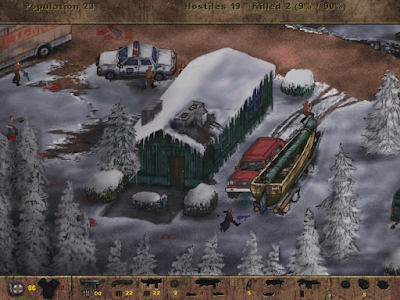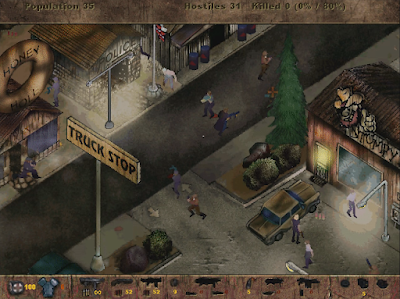For gamers of a certain age, Postal is a powerfully evocative title. Those who played it will not have easily forgotten their experience, and indeed, even those who haven’t played the game (myself included until recently) will likely recognise the name due to its notoriety. At its core this is because the entire raison d'être of Postal is to entertain its players through on-screen representations of unflinching gratuitous violence. Not violence in the context of a justifying purpose, or under circumstances that bear no semblance with reality, but remorseless mass shootings by a lone gunman.
Therefore, understandably, Postal will not be to everyone’s tastes. However, even those who find the game hard to stomach may have some appreciation for its developers who, whether intentionally or not, pushed back against those who sought (and still seek) to stifle the artistic freedom of game creators. Developed by Running With Scissors and originally released for PC and Mac in 1997, Postal arrived in the midst of ill-founded outrage directed towards video games by self-appointed moral arbiters and sensationalist sections of the media. Rather than focusing their ire on any of the other obvious causes of society's ills (say massive global inequalities, persistent unemployment, or chronically underfunded public services), the narrative being pushed by some was that video games were an exceptionally dangerous source of moral corruption. Within this context, Postal struck a defiant tone.
A mere 25 years on, Postal has now finally made its way to the Dreamcast, thanks to the meticulous work of Dan Redfield, who took on the challenge of porting the game after Running With Scissors released the source code to the public in December 2016. When the original developers jokingly asked for a Dreamcast version to be produced, I seriously doubt that they expected this outcome: a near flawless port running at a solid 60 frames per second, packed with features, and published professionally in a physical medium. The latter aspect is down to Norwich-based WAVE Game Studios, an outfit who have quickly cemented their reputation within the Dreamcast scene since publishing their first title for the console, Senile Team’s Intrepid Izzy, in August 2021.
Ok, enough with the pretentious preamble, what about the game itself? For those unfamiliar with it, Postal is an isometric shooter, with a smattering of top-down sections, in which the player takes on the role of an unnamed protagonist (simply referred to as ‘Postal dude’). As alluded to above, the premise of the game is quite simple: you roam from level-to-level taking down as many enemy combatants as possible. And although it isn't a prerequisite for progress, the player is presented with ample opportunities to slaughter seemingly innocent civilians too. There really isn’t a great deal of plot: each stage is preceded by a cryptic and often foreboding message, presumably stemming from the pen of the main character, which along with the visuals suggests that Postal dude is gripped by some kind of madness. This lack of plot depth doesn’t necessarily detract from the game though—the no-nonsense approach is focused on dropping you straight into the action and keeping you on your toes at all times. This lends itself nicely to short bursts of gameplay, and the dry sense of humour that occasionally rears its head ensures that the mood isn't as depressing as the subject matter might suggest at first glance.
To facilitate your mission, Postal dude is equipped with a range of weapons with varying characteristics (range, damage, shot frequency), from the low-powered sub-machine gun, through to the more outlandish and spectacular napalm launcher. As with any shooter the aim is to hit your targets while avoiding taking damage. On the face of it, the gameplay of Postal can appear to be quite invariable and a little shallow. On the easier modes it can certainly be played in a mindless manner, with your character capable of tearing through stages while soaking up incoming fire to little effect. However, at its heart, the gameplay is rooted in strategic thinking – something which becomes mandatory if you wish to progress in the harder difficulty settings. Making careful use of terrain, being mindful of your inventory, and deciding when to fight and when to run, all need to be brought into play if you want to actually do well.












